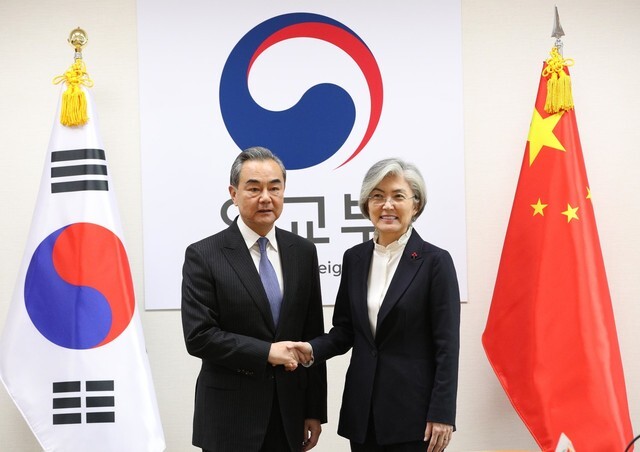hankyoreh
Links to other country sites 다른 나라 사이트 링크
Chinese foreign minister visits S. Korea for first time since 2017

Chinese State Councilor and Minister of Foreign Affairs Wang Yi visited South Korea for the first time since the two sides’ 2017 dispute over South Korea’s decision to host the US’ Terminal High Altitude Area Defense (THAAD) system. Wang met with South Korean Foreign Minister Kang Kyung-wha to discuss ideas for improving bilateral relations and issues concerning the Korean Peninsula and Northeast Asian political situation. As the first official South Korea visit by a Chinese foreign minister in the five years and seven months since May 2014, many are watching to see whether it leads to the two sides moving past the fallout from the THAAD episode and restoring their relationship.
Wang’s meeting that afternoon with Kang at the Ministry of Foreign Affairs (MOFA) complex in Seoul lasted for two hours and 20 minutes, extending well beyond the originally scheduled time. Afterwards, the two went to dinner together, when they discussed a broad range of issues concerning bilateral relations and the political situation on the Korean Peninsula. On Dec. 5, Wang was scheduled to stop at the Blue House for a courtesy visit with President Moon Jae-in. He was also slated for a luncheon event with current and former South Korean National Assembly members, businessmen, and media figures.
The biggest focus of attention with Wang’s visit is on whether a schedule will be finalized for a visit by Chinese President Xi Jinping. Although two years have passed since Moon’s visit to China in December 2017, Xi has not visited South Korea since July 2014, when he was a guest of the state during the Park Geun-hye administration. When asked the same day by reporters about the possibility of Xi visiting, Wang replied, “We intend to strengthen senior-level exchanges as neighbors and will continue to discuss [the issue].” Some have also mentioned a possible scenario of Xi visiting South Korea ahead of a Japan visit scheduled for around March of next year.
Another possibility is that Moon and Xi will meet during a trilateral summit with Japan that is scheduled to take place in Chengdu in China’s Sichuan Province late this month. While Premier Li Keqiang is slated to attend the summit on China’s behalf, a plan in which Moon meets with Xi in Beijing before heading on to Chengdu is currently under discussion. Whether Xi visits South Korea and takes part in a bilateral summit is seen as a key test for the improvement in relations between the two sides.
Wang’s South Korea visit came at a time of growing calls for stronger “neighbor diplomacy” within China as its competition for hegemony with the US intensifies. Commenting on restrictions on Chinese group tourism in South Korea and popular culture exchanges due to the “Korean Wave ban” imposed by China in the wake of the THAAD dispute, a MOFA official said, “It was agreed in the meeting today that we need to fully normalize bilateral relations.”
The meeting also included intensive discussions on ideas for stepping up strategic South Korea-China cooperation in terms of the peninsula’s political situation at a time when North Korea-US negotiations stand at an impasse and North Korea has announced plans to pursue a “new path.”
“We shared our perceptions of the current Korean Peninsula political situation,” a MOFA official said.
“We shared views on the two sides cooperating to ensure that progress is achieved in North Korea-US dialogue, based on our shared understanding that North Korea’s nuclear ownership cannot be tolerated and peace must be maintained on the Korean Peninsula.”
By Kim So-youn, staff reporter
Please direct comments or questions to [english@hani.co.kr]

Editorial・opinion
![[Column] Season 2 of special prosecutor probe may be coming to Korea soon [Column] Season 2 of special prosecutor probe may be coming to Korea soon](https://flexible.img.hani.co.kr/flexible/normal/500/300/imgdb/original/2024/0426/3317141030699447.jpg) [Column] Season 2 of special prosecutor probe may be coming to Korea soon
[Column] Season 2 of special prosecutor probe may be coming to Korea soon![[Column] Park Geun-hye déjà vu in Yoon Suk-yeol [Column] Park Geun-hye déjà vu in Yoon Suk-yeol](https://flexible.img.hani.co.kr/flexible/normal/500/300/imgdb/original/2024/0424/651713945113788.jpg) [Column] Park Geun-hye déjà vu in Yoon Suk-yeol
[Column] Park Geun-hye déjà vu in Yoon Suk-yeol- [Editorial] New weight of N. Korea’s nuclear threats makes dialogue all the more urgent
- [Guest essay] The real reason Korea’s new right wants to dub Rhee a founding father
- [Column] ‘Choson’: Is it time we start referring to N. Korea in its own terms?
- [Editorial] Japan’s rewriting of history with Korea has gone too far
- [Column] The president’s questionable capacity for dialogue
- [Column] Are chaebol firms just pizza pies for families to divvy up as they please?
- [Column] Has Korea, too, crossed the Rubicon on China?
- [Correspondent’s column] In Japan’s alliance with US, echoes of its past alliances with UK
Most viewed articles
- 1Is Japan about to snatch control of Line messenger from Korea’s Naver?
- 2‘We must say no’: Seoul defense chief on Korean, USFK involvement in hypothetical Taiwan crisis
- 3The dream K-drama boyfriend stealing hearts and screens in Japan
- 4[Editorial] Korea’s surprise Q1 growth requires objective assessment, not blind fanfare
- 5Division commander ordered troops to enter raging flood waters before Marine died, survivor says
- 6No good, very bad game for Korea puts it out of Olympics for first time since 1988
- 7S. Korea “monitoring developments” after report of secret Chinese police station in Seoul
- 8[Editorial] New weight of N. Korea’s nuclear threats makes dialogue all the more urgent
- 9[Reportage] On US campuses, student risk arrest as they call for divestment from Israel
- 10[Reporter’s notebook] To accept migrants isn’t enough — Korea must fight their exploitation